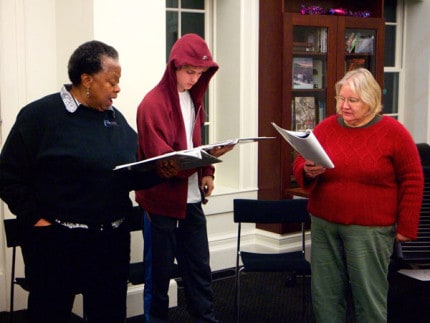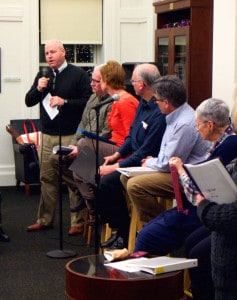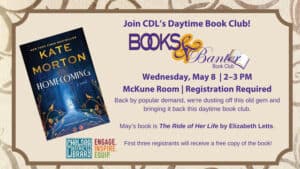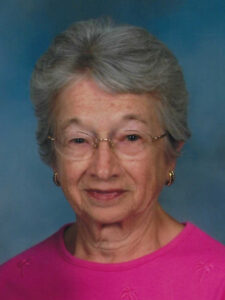
By Lisa Carolin
The topic of criminal justice reform drew close to 60 people to the Chelsea District Library on Jan. 6. That’s where Kathie Gourlay organized a play about restorative justice, specifically Victim Offender Conferencing, featuring eight actors, and followed by a discussion led by Pat Conlin, circuit judge for Washtenaw County.
Gourlay is a member of St. Mary Catholic Church in Chelsea and chair of its Charity and Justice Committee. She’s been involved in criminal justice reform for the past 20 years and volunteered as a tutor at Cassidy Lake prison.
“Within this viewpoint, crime is considered a violation of people and interpersonal relationships,” explained Gourlay. “The victim and the community have been harmed. This violation creates an obligation by the offender to right the wrong.”

As part of a restorative justice process, the community, the victim, and the offender all have the opportunity to communicate about the harm that was caused and how to repair it.
In the play performed on Jan. 6, a 16-year-old boy breaks into the home of an elderly widow and vandalizes it. He is caught, admits to the crime, and is offered restorative justice as an option to a punishment imposed by a judge. The 16-year-old agrees to paint the entire inside of the widow’s house and pay for the paint with savings he has from a job.
“He is then able to walk around his neighborhood without shame,” said Gourlay. “The widow, through getting to meet and talk to the vandal, does not fear him anymore. She willingly returns to live in her house.”
Restorative Justice is currently being used by Judge Tim Connors in Washtenaw juvenile court in family reunification cases where children have been removed due to abuse or neglect. Connors calls it “Peacemaking Court” and uses circles that include a facilitator, parents, social workers, support people, and other professionals who meet regularly to find ways to repair the family and restore its relationship to the community.
The process is also used by the Grizzly Community Support Center at Ypsilanti middle and high schools to reduce suspensions from school.
If you’d like to learn more about this topic, Gourlay gave two books to the Chelsea District Library on the subject: “The Little Book of Restorative Justice” by Howard Zehr and “The Little Book of Victim Offender Conferencing” by Lorraine Amstutz.
To get involved in with Restorative Justice of Washtenaw County, email [email protected]. The group meets the second Tuesday of the month at 7 p.m. at the First Unitarian Universalist Congregation Church of Ann Arbor.


















